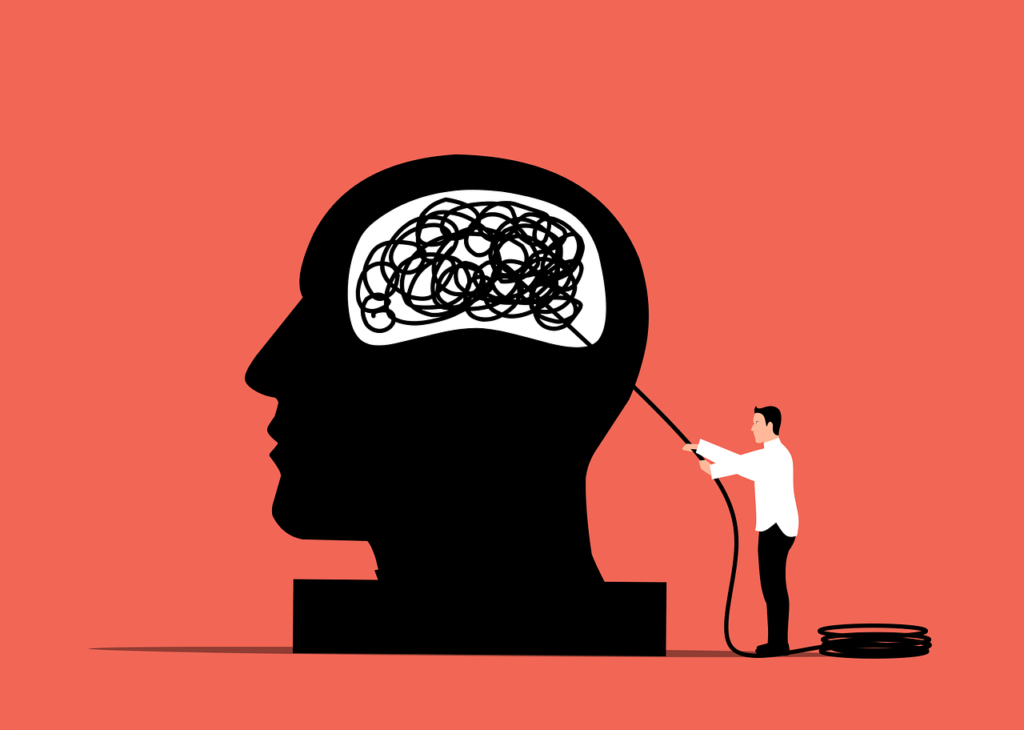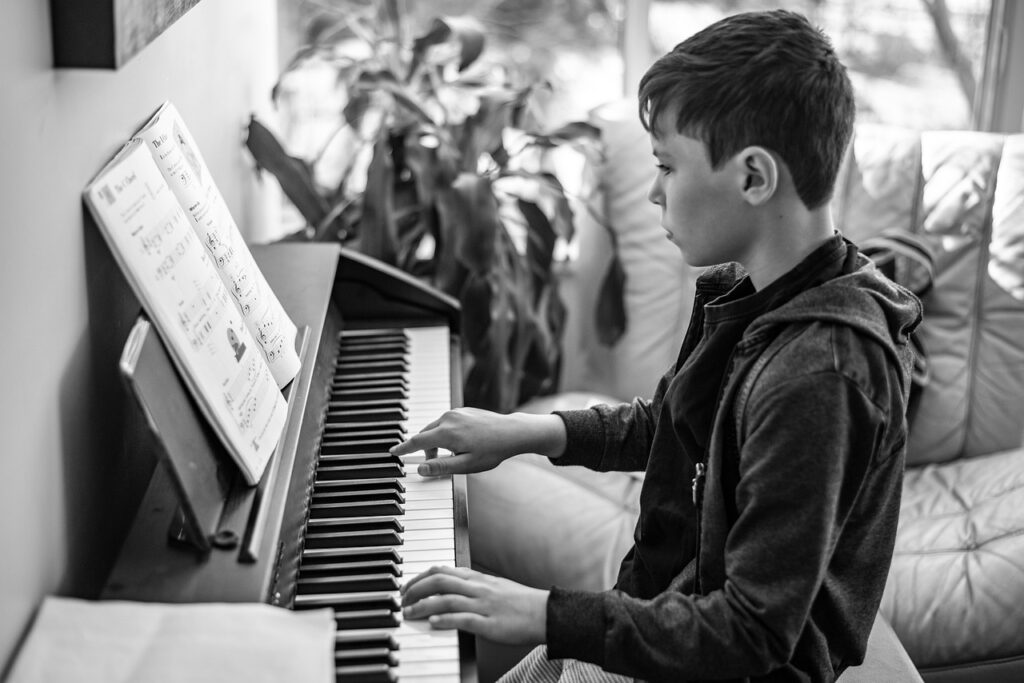Last week I was interviewed live on Radio Berkshire about Thame Music Therapy. It was a light, magazine-type feature piece (think small talk in a cafe rather than a Radio 4 grilling), and it needed to have a broad appeal and touch on everyday life.
It was an engaging conversation, with lots of interesting subjects raised, but I was left feeling a little uneasy and dissatisfied. Why? Well I felt I didn’t really do justice to my work at Thame Music Therapy, or to the profession of Music Therapy.
Whatever misgivings I may have about how the interview went, the discussion brought up some really important questions about the identity of Music Therapy; how easily it can be misunderstood, misconstrued, even trivialised.
If you’re in the mood, you can listen to the full conversation:
Below I unpick the two major themes that have been on my mind in the last few days.
Music Therapy vs music lessons
Early questions from the presenter were about learning instruments; how it is that so many people start an instrument but then don’t keep it up. Why are so many people put off?
This is a genuinely fascinating question for me and you can hear what I had to say about the importance of connecting instrumental tuition to someone’s broader musicality, personality and social circles.
But, and it’s a big but, what I’m not sure the presenter understood was that having music lessons is very different to having Music Therapy. And in fairness, I didn’t spell it out, so I’m going to try and do that now.
The core aims of Music Therapy are generally around emotional well-being, psychological growth and improving quality of life. Interactive music-making and reflection, within a therapeutic relationship, combine to facilitate these holistic aims.
Music Therapists are trained in a range of different developmental and psychological theories (e.g. Freud, Winnicott, Ainsworth, Maslow), as well as in specific musical techniques for accessible and inclusive music-making.

In the bigger picture, Music Therapy is a recognised psychological therapy with a protected title (hence the capital letters), regulated by the Health & Care Professions Council (HCPC) with certain fundamental standards of proficiency.
It means that sessions can only be facilitated by qualified and registered Music Therapists and when someone accesses Music Therapy, it is usually because there is a challenge in their life (e.g. processing difficult events, understanding and living with complex conditions, feeling emotionally and socially isolated) for which they need some support.
In contrast, generally the aims in music lessons or music tuition are music-based. The teacher is likely to take on a more direct role offering specific advice and tools to develop instrumental or vocal techniques. They (broadly speaking) offer opportunities to improve your skills, build knowledge and try to help you gain confidence in certain areas of your musical development.
The bi-product may be of great benefit to well-being and mental health, but it’s not necessarily at the forefront of the teacher’s initial aims or learning activities. And music teachers, although often highly trained, experienced and with acute interpersonal sensitivities, are not regulated in the same way as Music Therapists.
So you could feasibly have a young, budding guitarist with no formal training offering music lessons. And it could work out really well for all concerned, but that same guitarist couldn’t offer Music Therapy without the relevant training and accreditation.
How both are put into practice…
To put it into context, here’s a quick example of how my approaches in music lessons and Music Therapy might vary. Let’s say a teenager shares a song they’ve recently heard and really love…
In a piano lesson, I might try to find an arrangement of the song that the young person (who in this context I would call a ‘student’) can play in a manageable way; talk about the musical style and context, maybe historical references, the chords, rhythms etc.
I would try to connect this to other techniques they’ve recently been working on and build the piece into their overall musical development. If suitable for the young person, I might work towards them doing a performance or recording of the song. If not, I would certainly think about building up their confidence in playing the piece over a number of lessons and trying to play the whole thing in a lesson.
As part of the process, I would likely suggest some specific areas for the student to practise (that dreaded word!) away from our lessons and try to find creative ways to overcome any stumbling blocks in the student’s learning.

In a Music Therapy session, I would be more likely to explore the emotional meaning of the song for the young person (who I would in this context refer to as a ‘client’). Some of this might be through direct questions, some of it in my own internal reflections.
What is it about this particular song (the lyrics, the sounds, the mood) that makes such a strong connection to them, their experiences, their relationships. What is it that this young person wants to tell me, consciously or unconsciously, by bringing it to the session that day. If we were to try and sing that song or play it together, what would the interpersonal dynamics be like and how would they want it to sound?
I wouldn’t be suggesting any particular music practice outside sessions as I wouldn’t want to unfairly influence subsequent sessions. The following week, they might be in a different mood, want to talk about something else, do something else and I’d want to be open to that.
If I did propose anything for them to do outside sessions, it might be a listening recommendation (if you like this you might enjoy listening to that) or more a suggestion about something for them to think about and reflect on, based on how they were that day.
I could go on and there are lots of permutations to explore about how these two roles differ, some of which would clearly demarcate them, others that would muddy the water.
It’s certainly not all a black and white issue; some teachers are more sensitive to the emotions of their students and the impact and importance of their working relationship, while some Music Therapists can be more directive and structured about specific musical activities.
But there are really important differences in the framework and aims of the respective professions and how I would see myself in either of the roles.
As both a teacher and therapist, this isn’t a value judgement on either of those two approaches by the way. I like doing both and I think both can offer something really powerful. It’s just important to clarify how and why the approaches might be different.
Music as therapy? That’s also different from Music Therapy…
In the second half of the interview, I was asked about how certain pieces of music can change mood; how music might help you get motivated for exercise, for example.
This was very much a case of the presenter talking about music as therapy (music itself acting as an accessible, everyday therapeutic tool) rather than the actual practice of Music Therapy. Or perhaps, when she commented “they say if you could sing all your exams then you’d probably do really well,” she was thinking about music as an educational tool and memorisation aid.
As with the theme of music teaching, these are both really interesting points of discussion. What is it about certain pieces of music that, for different people at different times, can really shift mood? And in terms of our neurological makeup, what is it that music can offer us in terms of our learning and brain development?
You can see the piece of research I quoted from the University of Central Florida here, which offers a really insightful breakdown of musical and neurological connections. I went on to talk about some of the benefits of singing and there is a lovely, accessible breakdown of some of these benefits on the Opera North website here. But neither of these pieces are especially related to my own areas of expertise.

Within Music Therapy, there are close connections between music and neuroscience, particularly when it comes to a specific branch of the profession, called Neurologic Music Therapy, which is often used in work for those with an acquired brain injury or a neuro-degenerative condition, such as dementia.
Here’s that but again though, which is that there was an implication from the presenter that as a Music Therapist, I’m thinking about music as an independent entity which can be objectively prescribed or used for specific circumstances. That the music can be separated from personal experience and interpersonal interaction, both of which are fundamental to Music Therapy.
Before I went on air, I was asked if I could recommend particular music to help people sleep or prepare for a job interview. It got me thinking about a surreal world where a Music Therapist somehow has an infinite knowledge of what precise music would be best for any possible set of circumstances.
I imagined taking up residence at the local GP surgery and preparing for my first consultation:
Patient: I’ve got an important exam coming up. Could be a game changer for me. Not sure how to prepare. Any thoughts?
Music Therapist: Has to be Mozart’s Symphony no.40 the night before, preferably just the second movement, followed by ‘Eye of the Tiger’ by Survivor the morning of.
Patient: Ok brilliant, thank you. Actually, while I’m here, I’m wondering what music to play for a second date I’ve got coming up.
Music Therapist: Second date you say? Hum, tough one. I’d definitely recommend some late Sam Cooke; try the album ‘Night Beat.’ You can pick up your playlist from the chemist next door. All the best.
I jest, of course, although maybe Sam Cooke would be good for a second date (answers on a postcard) but I think there’s some truth in the way that Music Therapy can sometimes be misunderstood or trivialised. I’m not knocking the potential benefits of listening to music at all, and it can have very poignant connections to mood, memory and relationship.
I just don’t feel that, outside the context of working with someone in Music Therapy, I have the expertise to advise on those things any more than a lay person who has a passionate or even passing interest in music. My oldest brother, for example, who gave up piano lessons after a year or so and has much more interest in sport than music, might have an inspirational song idea for getting you motivated to go to the gym. And that’s great.
I, or the profession of Music Therapy, has no right to hold any kind of hierarchical insight on that matter.
At Thame Music Therapy I consider music (whether the music we listen to in a session, the music we make, the musicality of someone’s voice or their movements) to be part of an ongoing therapeutic relationship with wider implications and ramifications.
And this is what I am offering; music as one part (but not the only part) of an attentive working relationship to support someone’s mental health and, hopefully, long-term emotional growth.
In Music Therapy, I see the inherent values of music as connected to the experience of human connection, acceptance, validation, self-awareness and self-expression, rather than merely a form of medicine disconnected from human interactions.
Right, that’s me done for now. My media demons are temporarily cast aside. Until the next time!
